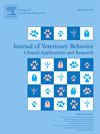Euthanasia and prolonged grief: A cross-sectional study with bereaved pet owners
IF 1.6
3区 农林科学
Q4 BEHAVIORAL SCIENCES
Journal of Veterinary Behavior-clinical Applications and Research
Pub Date : 2025-05-01
DOI:10.1016/j.jveb.2025.04.007
引用次数: 0
Abstract
The grief experienced from the loss of a pet involves a complex and unique emotional journey. The act of euthanizing a pet can significantly influence how owners navigate this grieving process. This study aims to assess the association of euthanasia and the grieving process of individuals mourning the loss of a pet. A total of 123 pet owners (79.3% female) who had experienced the loss of a pet completed the Pet Bereavement Questionnaire, the Persistent Complex Bereavement Inventory, and a set of questions regarding the circumstances surrounding their loss. Significant positive correlations were found between the intensity of grief reactions and several variables: owner’s age, feelings of exclusion from the euthanasia decision by the veterinarian, regret over the decision to euthanize prematurely, and guilt associated with that decision. Conversely, statistically significant negative correlations were found between grief intensity and the time elapsed since pet’s death, as well as between guilt and the perception that the veterinary team responded to the emotional needs of the owners. Female owners reported higher average levels of grief intensity and prolonged grief. Owners of euthanized pets experienced lower levels of guilt, but more grief compared to those whose pets were not euthanized. The study identifies associations between euthanasia and complex emotional outcomes for pet owners. The emotional response to pet loss is associated to various factors, including the degree of involvement in the euthanasia decision and the perceived support from veterinary professionals. These findings emphasize the need for sensitive and supportive approaches in veterinary care to help pet owners navigate the grieving process effectively.
安乐死与长期悲伤:对宠物主人的横断面研究
失去宠物所经历的悲伤包括一个复杂而独特的情感旅程。对宠物实施安乐死的行为会显著影响主人如何度过这个悲伤的过程。这项研究的目的是评估安乐死和个人哀悼失去宠物的悲伤过程的关系。共有123名失去宠物的宠物主人(79.3%为女性)完成了“宠物丧亲问卷”、“持续性复杂丧亲问卷”和一系列关于他们失去宠物的情况的问题。研究发现,悲伤反应的强度与以下几个变量之间存在显著的正相关关系:主人的年龄、被兽医排除在安乐死决定之外的感觉、对过早安乐死决定的后悔,以及与该决定相关的内疚感。相反,从统计上看,悲伤强度与宠物死亡后的时间流逝之间存在显著的负相关,内疚与兽医团队对主人情感需求的反应之间也存在显著的负相关。女性主人报告的平均悲伤强度和悲伤持续时间更高。与那些宠物没有被安乐死的人相比,被安乐死宠物的主人有更低的负罪感,但更多的悲伤。这项研究确定了安乐死与宠物主人复杂的情感结果之间的联系。失去宠物的情绪反应与各种因素有关,包括参与安乐死决定的程度和兽医专业人员的支持。这些发现强调了兽医护理需要敏感和支持的方法来帮助宠物主人有效地度过悲伤的过程。
本文章由计算机程序翻译,如有差异,请以英文原文为准。
求助全文
约1分钟内获得全文
求助全文
来源期刊
CiteScore
3.50
自引率
16.70%
发文量
107
审稿时长
325 days
期刊介绍:
Journal of Veterinary Behavior: Clinical Applications and Research is an international journal that focuses on all aspects of veterinary behavioral medicine, with a particular emphasis on clinical applications and research. Articles cover such topics as basic research involving normal signaling or social behaviors, welfare and/or housing issues, molecular or quantitative genetics, and applied behavioral issues (eg, working dogs) that may have implications for clinical interest or assessment.
JVEB is the official journal of the Australian Veterinary Behaviour Interest Group, the British Veterinary Behaviour Association, Gesellschaft fr Tierverhaltensmedizin und Therapie, the International Working Dog Breeding Association, the Pet Professional Guild, the Association Veterinaire Suisse pour la Medecine Comportementale, and The American Veterinary Society of Animal Behavior.

 求助内容:
求助内容: 应助结果提醒方式:
应助结果提醒方式:


